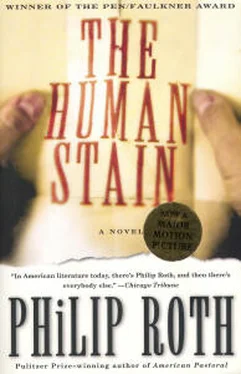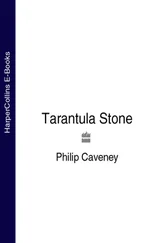“If you've never seen the opponent before?” asked his father, with all the restraint on his sarcasm he could muster.
“All I mean,” Coleman said, “is you don't have to get mad.”
“But,” his mother asked, “what if the other boy is mad?”
“It doesn't matter. It's brains that win, not getting mad. Let him get mad. Who cares? You have to think. It's like a chess game. Like a cat and a mouse. You can lead a guy. Last night, I had this guy, he was about eighteen or nineteen and he was sort of slow. He hit me with a jab on the top of my head. So the next time he did it, I was ready for it, and boom. I came over with the right counter and he didn't know where it came from. I knocked him down. I don't knock guys down, but I knocked this guy down. And I did it because I got him into thinking that he could catch me again with this punch.”
“Coleman,” his mother said, “I do not like the sound of what I'm hearing.”
He stood up to demonstrate for her. “Look. It was a slow punch. You see? I saw his jab was slow and he wasn't catching me. It was nothing that hurt me, Mom. I just was thinking that if he does it again, I'll slip it and bang over with the right. So when he threw it again, I saw it coming because it was so slow, and I was able to counter and catch him. I knocked him down, Mom, but not because I was angry. Because I box better.”
“But these Newark boys you fight. They're nothing like the friends you have,” and, with affection, she mentioned the names of the two other best-behaved, brightest Negro boys in his year at East Orange High, who were indeed the pals he had lunch with and hung around with at school. “I see these Newark boys on the street. These boys are so tough, ” she said. “Track is so much more civilized than boxing, so much more like you, Coleman. Dear, you run so beautifully.”
“It doesn't matter how tough they are or how tough they think they are,” he told her. “On the street it matters. But not in the ring. In the street this guy could probably have beat me silly. But in the ring? With rules? With gloves? No, no — he couldn't land a punch.”
“But what happens when they do hit you? It has to hurt you. The impact. It must. And that's so dangerous. Your head. Your brain? ”
“You're rolling with the punch, Mom. That's where they teach you how to roll your head. Like this, see? That reduces the impact. Once, and only once, and only because I was a jerk, only because of my own stupid mistake and because I wasn't used to fighting a southpaw, did I get a little stunned. And it's only like if you bang your head against the wall, you feel a little dizzy or shaky. But then all of a sudden your body comes right back. All you have to do is just hold on to the guy or move away, and then your head clears up. Sometimes, you get hit in the nose, your eyes get a little watery for a second, but that's it. If you know what you're doing, it's not dangerous at all.”
With that remark, his father had heard enough. “I've seen men get hit with a punch that they never saw coming. And when that happens,” Mr. Silk said, “their eyes don't get watery — when that happens, it knocks them cold. Even Joe Louis, if you recall, was knocked cold — wasn't he? Am I mistaken? And if Joe Louis can be knocked cold, Coleman, so can you.”
“Yeah, but Dad, Schmeling, when he fought Louis that first fight, he saw a weakness. And the weakness was that when Louis threw his jab, instead of coming back—” On his feet again, the boy demonstrated to his parents what he meant. “Instead of coming back, he dropped his left hand — see?—and Schmeling kept coming over — see? — and that's how Schmeling knocked him out. It's all thinking. Really. It is, Dad. I swear to you.”
“Don't say that. Don't say, ‘I swear to you.’”
“I won't, I won't. But see, if he doesn't come back, where he's back in position, if he comes here instead, then the guy's going to come over with his right hand and eventually he's going to catch him. That's what happened that first time. That's exactly what happened.”
But Mr. Silk had seen plenty of fights, in the army had seen fights among soldiers staged at night for the troops where fighters were not only knocked out like Joe Louis but so badly cut up nothing could be done to stop the bleeding. On his base he had seen colored fighters who used their heads as their main weapon, who should have had a glove on their heads, tough street fighters, stupid men who butted and butted with their heads until the face of the other fighter was unrecognizable as a face. No, Coleman was to retire undefeated, and if he wanted to box for the enjoyment of it, for the sport, he would do so not at the Newark Boys Club, which to Mr. Silk was for slum kids, for illiterates and hoodlums bound for either the gutter or jail, but right there in East Orange, under the auspices of Doc Chizner, who'd been the dentist for the United Electrical Workers when Mr. Silk was the optician providing the union's members with eyeglasses before he lost the business. Doc Chizner was still a dentist but after hours taught the sons of the Jewish doctors and lawyers and businessmen the basic skills of boxing, and nobody in his classes, you could be sure, ended up hurt or maimed for life. For Coleman's father, the Jews, even audaciously unsavory Jews like Dr. Fensterman, were like Indian scouts, shrewd people showing the outsider his way in, showing the social possibility, showing an intelligent colored family how it might be done.
That was how Coleman got to Doc Chizner and became the colored kid whom all the privileged Jewish kids got to know — probably the only one they would ever know. Quickly Coleman came to be Doc's assistant, teaching these Jewish kids not exactly the fine points of how to economize energy and motion that Mac Machrone had taught his ace student but the basics, which was all they were up to anyway—“I say one, you jab. I say one-one, you double-jab. I say one-two, left jab, right cross. One-two-three, left jab, right cross, left hook.” After the other pupils went home — with the occasional one who got a bloody nose packing it in, never to return — Doc Chizner worked alone with Coleman, some nights building up his endurance mainly by doing infighting with him, where you're tugging, you're pulling, you're hitting, and so afterward, by comparison, sparring is kid's play. Doc had Coleman up and out doing his roadwork and his shadowboxing even as the milkman's horse, drawing the wagon, would arrive in the neighborhood with the morning delivery. Coleman would be out there at 5 A.M. in his gray hooded sweatshirt, in the cold, the snow, it made no difference, out there three and a half hours before the first school bell. No one else around, nobody running, long before anybody knew what running was, doing three quick miles, and throwing punches the whole way, stopping only so as not to frighten that big, brown, lumbering old beast when, tucked sinisterly within his monklike cowl, Coleman drew abreast of the milkman and sprinted ahead. He hated the boredom of the running — and he never missed a day.
Some four months before Dr. Fensterman came to the house to make his offer to Coleman's parents, Coleman found himself one Saturday in Doc Chizner's car being driven up to West Point, where Doc was going to referee a match between Army and the University of Pittsburgh. Doc knew the Pitt coach and he wanted the coach to see Coleman fight. Doc was sure that, what with Coleman's grades, the coach could get him a four-year scholarship to Pitt, a bigger scholarship than he could ever get for track, and all he'd have to do was box for the Pitt team.
Now, it wasn't that on the way up Doc told him to tell the Pitt coach that he was white. He just told Coleman not to mention that he was colored.
Читать дальше












